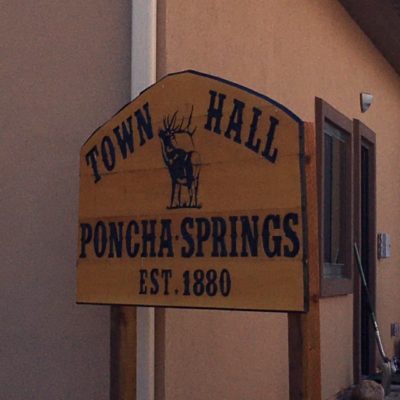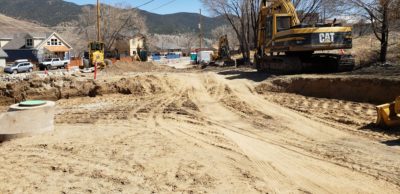In a press release issued on May 17, Salida City Administrator Drew Nelson announced that the Town of Poncha Springs and two development companies, Tailwind Group LLC and Full Views Matters LLC, had filed suit against the City of Salida in Chaffee County District Court on May 12.
At issue is the Intergovernmental Agreement (IGA), signed in 2010 between the City of Salida and the Town of Poncha Springs, regarding the creation of a unified sewer system between the two municipalities. The Town of Poncha Springs would cease operating its own wastewater treatment plant and the new joint system would be administered by the City of Salida. The IGA established that current and new customers would pay the same rates for water tap and sewer fees.

Poncha Springs Town Hall sign (Photo by Jan Wondra)
Both parties agree on that basic set of facts. Where the difficulty lies currently is that at that time, surely few people would have anticipated the explosive rate of growth that began when Poncha Springs revised its land use code in 2016.
Shortly after that, the town began approving new development at a pace, according to the press release, that has caused it to expand by a rate of more than 33 percent in the past three years.
This rate of growth alarmed Salida city officials, who began in 2017 to warn that the current pipeline between Salida and Poncha Springs, known as the Poncha Interceptor, would be unable to handle that amount of use without substantial upgrades to the system.
Late in 2019, the Salida City Council and the Poncha Springs Board of Trustees met for a joint work session, where Salida city officials laid out a plan for upgrades to the system at an estimated cost of $14 million.
According to Nelson, in a telephone interview, Poncha Springs officials “questioned the findings of the engineer” involved in drawing up the study, and in the intervening years, have shown “a refusal to negotiate.” The negotiations referred to are around the issue of the IGA.
Salida has been urging Poncha Springs to cooperate in amending the existing IGA, or come up with a new one that reflects the new realities of growth and wastewater treatment. Poncha Springs has declined to do so – or consider any curb on its current growth rate. This refusal, in turn, exasperated the City of Salida to the point where, in 2022, it finally issued an ultimatum to Poncha Springs and developers: new sewer tap permits would be contingent upon a renegotiated IGA. The practical effect of this not-quite-moratorium has been to stymie the Tailwinds and Full Views developments.
And that’s where the lawsuits come in.

Touber Building, Salida City Hall Entrance and B Street parking lot, 12:51 p.m. on April 7, 2022. Merrell Bergin photo
The biggest point of contention between the two municipalities appears to hinge on who, exactly, should be paying for new infrastructure. Each side cites “fairness” in defense of its respective position.
The official position of the City of Salida, according to yesterday’s press release, is “that new growth should ‘pay its way’ for the costs of public improvements required to serve such new development. This includes necessary improvements for wastewater service, and the city says that it is unfair for other customers and property owners to bear the burden of such costs.”
But a statement released to AVV by Poncha Springs Town Manager Brian Berger frames the issue of “fairness” from a slightly different perspective: namely, that under the terms of the 2010 IGA currently in place, it is unfair to expect future rate-payers to bear the sole brunt of infrastructure costs.
“Importantly, the City and the Town agreed at that time that all customers of the unified system would pay the exact same rates for tap fees and sewer service…However, Salida has recently decided to unilaterally refuse access to the sewer system for new customers in Poncha Springs unless the town agrees to revise the 2010 agreements to place the (estimated at $14M) cost of a new interceptor only on Poncha Springs customers” explains Berger. “This is contrary to the 2010 agreements and is having the effect of shutting down all development in Poncha Springs – another violation of the 2010 agreements.”
The summons and complaint filed with the Chaffee County Court provides a timeline in its summary. It states that per the terms of the IGA, developers would need to present evidence of sewer tap fee applications and payments to the City of Salida, known as Line Extension Agreements, before they could build.

Reconfiguration of West Third and M Streets and sewer line in Salida underway April 9, 2021 as city prepares to transfer deed to Chaffee Housing Trust for affordable housing project. Merrell Bergin photo
The summary complaint asserts that between 2010 and 2019, the City of Salida was providing Line Extension Agreements to developers in Poncha Springs and charging them the same fees as Salida developers.
Then: “Beginning in 2019 and persisting through 2022, Salida attempted to change the Line Extension Agreements so that Poncha Springs developers would be charged greater Sewer Tap Fees than Salida charged Salida developers, thereby breaching the Transfer and Services Agreements [of the original IGA].”
“In 2022, Salida instituted a new plan,” it continues: “It would not approve new Line Extension Agreements for Poncha Springs developers unless Poncha Springs agreed to amend the Transfer and Services Agreements to permit Salida to charge Poncha Springs developers greater Sewer Tap Fees than Salida charges to Salida developers.”
According to Poncha Springs, this is not only unfair to the town and the developers, but amounts to a breach of contract. It remains to be seen what action the City of Salida will take in response to the summons, but it seems safe to say that the matter will remain in the court system for some time to come.
In future articles, AVV will be examining the text of the original IGA, the content of the summons, and the implications that statewide trends, as well as this legal action, have for local development.







The new residents of poncha springs are renting some of these units for 2500+ a month and can easily afford this. They need to pay for their greed
Why should Salida or Chaffee County subsidize this irresponsible growth plan in any way at all? If Poncha Springs wants to turn their town into another disaster like Aspen or Breckinridge, let them pave their own road to hell at their own expense.
Let the agreement expire, and leave Poncha Springs to live with, and deal with, the results of letting developers run wild. Simultaneous to that, set about making sure that Poncha Springs isn’t busy sucking dry the aquifer that we all depend on here in Chaffee County.